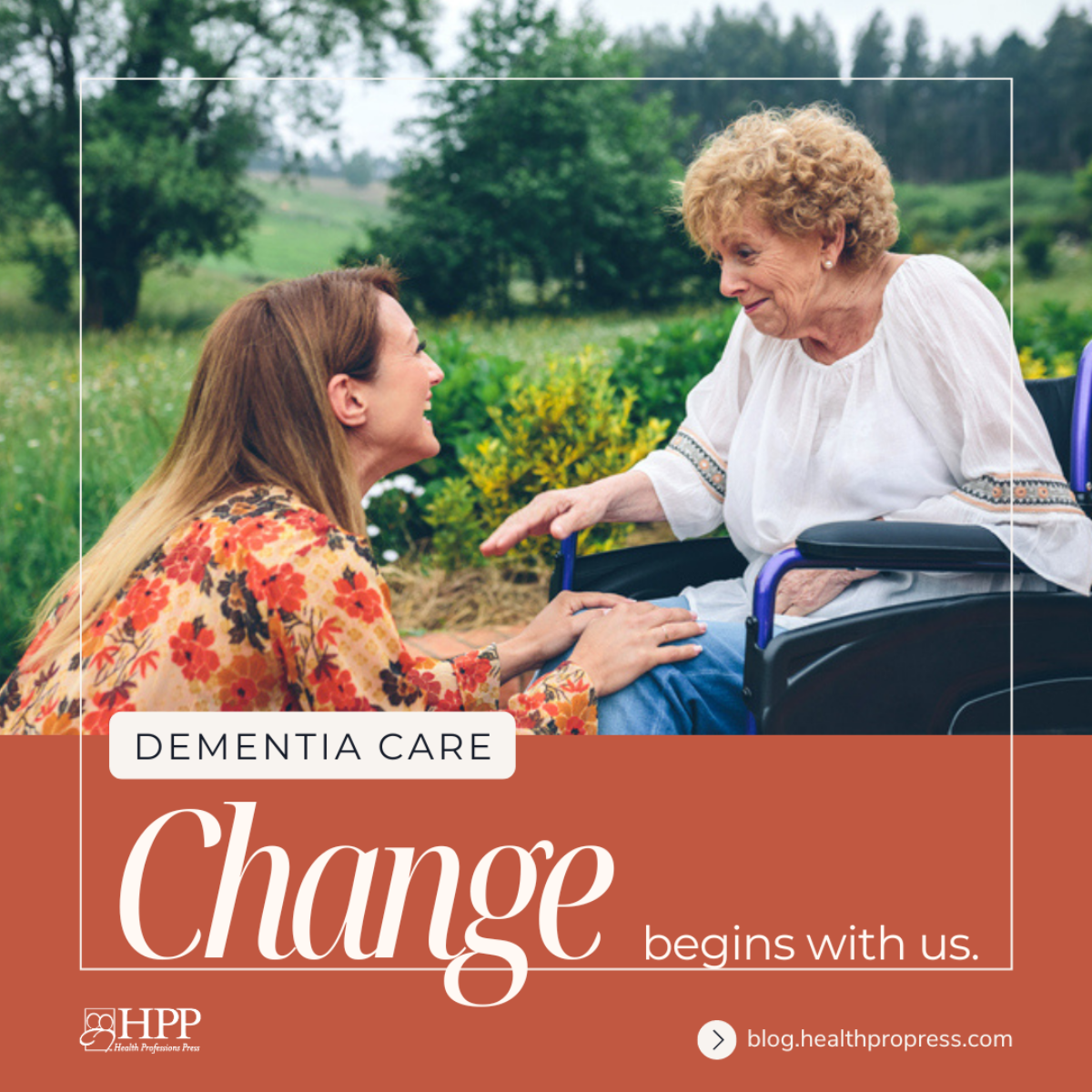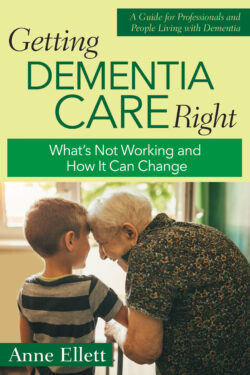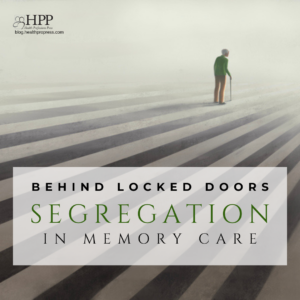
Dementia Care: Change Begins with Us
This post is adapted from Getting Dementia Care Right: What’s Not Working and How It Can Change by Anne Ellett, M.S.N., NP. Copyright © 2023 by Health Professions Press, an imprint of Paul H. Brookes Publishing Co., Inc. All rights reserved.
Memory care is the fastest-growing area of senior living. Yet over the past many years, while there has been a proliferation of new attractive modern buildings, I have seen a lack of innovation and resources put toward staffing and education that would humanize and honor the human rights of residents with dementia. In the majority of residential care communities where I have worked, staff and leadership express the desire to improve their model of care for these residents, yet say they lack the confidence or resources to initiate and operationalize change.
I am optimistic about the potential for positive change. I have worked long enough in the field of healthcare that I can remember the dark, foul-smelling hallways of old nursing homes, the instructions to tie people into their beds or wheelchairs to “keep them safe,” and the regular administration of strong drugs such as Haldol to keep everyone quiet. We have, thank goodness, moved on from those days!
Despite the progress, much of the care, particularly for residents living with dementia, is outdated. It is mired in policies and procedures that limit and restrict the experiences of residents and prioritize surplus safety over individual rights and needs. Many people emphasize the modern buildings and the use of terms such as culture change, choice, quality of life, and person-directed care to indicate that care has improved, but in reality change has been slow. Residents with dementia continue to be segregated in locked memory care units, pharmaceutical interventions are still liberally administered to diminish the expression of needs and desires, and it is not unusual to see many residents sitting or sleeping in uncomfortable wheelchairs for long periods of time and having no meaning or purpose in their day.
For those of us working in assisted living or nursing homes, change starts with each of us. I was taught as a nurse practitioner that segregated units were necessary for the safety of the residents and to keep them from “eloping” (leaving without permission). This concept of surplus safety gave me permission as a professional to make important decisions for the residents, such as where they could walk, sit, eat their meals, or whether they could go outside. I was taught to identify them by their diagnosis and inabilities, further disabling them by the restrictions I put on them. Questioning these ideas can take some effort.
Many obstacles that leaders list today as reasons for lack of change—short staffing, not enough time for training, high staff turnover, budget restrictions, too much regulatory oversight—have been the case for years. These challenges and obstacles are never going to go away.
I have witnessed teams assess their actions, their language, and their excessive use of pharmaceuticals to dampen the behaviors of residents. Teams and staff, working together, have decided to make changes. One staff member can change his or her own perspective of the abilities, rights, and desires of residents and begin to problem solve in a different way. Change starts with each of us. We must all become advocates.
As professionals, we can better listen to what people living with dementia tell us they need to maintain their independence and dignity. We have developed a template for care for residents with dementia, providing them with a product without ever getting any real input from them. Many people living with dementia will reside in residential communities for several years at the end of their lives. This is a part of their lives that is so poignant for both residents and family members. It is so important we get it right.
Our job is to see the whole person and support them to live well, not to complete a list of tasks or keep them subdued by medications or impose unnecessary restrictions on their day. What if at the end of a care partner’s shift we recognized him or her for having helped the residents to have a good day, instead of for completing a list of tasks?
All of us working as professionals can take time to “pause and be with,” observing the words and actions as communication, not meaningless behaviors. Ask yourself what you would want, and how you would respond. If you were confined in a small area, with all doors locked, would you pace back and forth? Would you bang on the door? Would you yell and be angry at the people you thought were confining you? Of course you would; we all would! These are normal and expected adult expressions of being upset. However, often we use these types of actions by residents with dementia to validate our misperceptions that they have “behaviors” we need to treat with medications, rather than understanding their actions can be appropriate displays of distress.
Dementia is considered the most feared health condition, more feared than cancer or heart disease. Just about everyone knows a family member or a friend who is affected by dementia, often residing in a care community such as a nursing home or assisted living community. The people I have spoken with express fear that they too may someday be diagnosed with dementia and need to live in residential care. “We see people sitting all day, usually in wheelchairs, just staring, or people screaming and calling out. I hate visiting these places,” one person told me. None of us should be resigned to accepting care that is lacking dignity and basic human freedoms.
The majority of older people say they want to live and die in their own homes, yet this may result in isolation, depression, and inability to maintain one’s own health and environment. Assisted living and nursing homes will continue to be valuable resources for people as they age, offering socialization and care oversight. However, the need for these services should not come at the cost of basic freedoms and dignity. From my experiences working in senior communities throughout the country, I have seen many real-life examples of what good support can look like, offering continued independence, normality, and purpose.
In my work as a nurse’s aide, registered nurse, and nurse practitioner; the owner of a care management business; a C-suite executive in nursing homes and assisted living companies; and most recently a consultant to improve memory care, I have continued to witness the hard work and dedication by staff at all levels. And I have seen staff become advocates for change once they realize their own actions may be further disabling the residents living with dementia.
Change, indeed, is possible, and it starts with each of us.
Read the book!
 Getting Dementia Care Right
Getting Dementia Care Right
What’s Not Working and How It Can Change
By Anne Ellett, M.S.N., NP|
Copyright © 2023 by Health Professions Press, an imprint of Paul H. Brookes Publishing Co., Inc. All rights reserved.
Take a journey with Anne Ellett through a landscape of successful dementia care that is entirely possible yet too rarely seen in current care settings. Her encouraging descriptions of realistic, actionable practices will help set a course for positive change in the lives of residents and care staff alike.
Drawing on extensive nursing and administrative experience in assisted living and skilled nursing communities, Ellett explores the obsolete ideas and programs behind current dementia care practices, and contrasts these with innovative alternatives from across the country. In the process, she challenges ordinary perceptions of what is possible for people living with dementia. While acknowledging common obstacles to progress—ill-informed attitudes, staffing limitations, organizational pressures, surplus safety concerns, and more—Ellett describes both large and small strategies for overcoming these challenges to produce big changes in the lives of residents with dementia.





Add comment